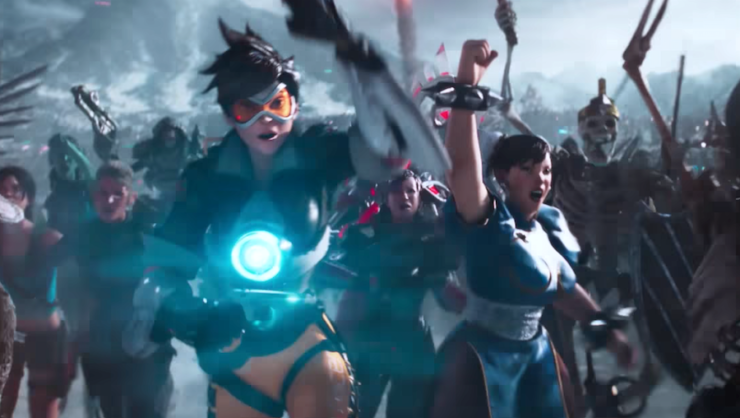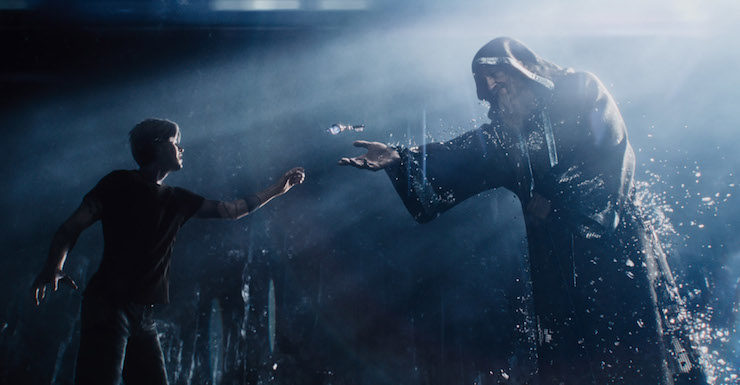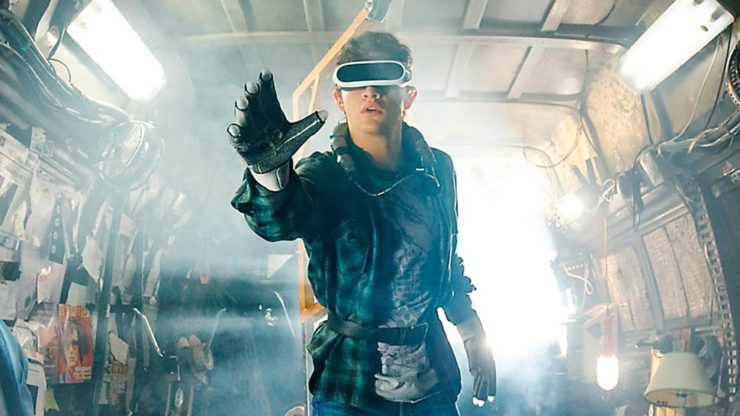Every time I sit down and attempt to organize my thoughts so I can write about Ready Player One (the movie) I can’t decide how to approach it—do I talk about the movie alone, the movie and the book, or the movie, the book, and the chatter surrounding it? But the more I think about the relationship Ready Player One has with readers and multiple mediums, the more I realize how perfect these relationships reflect what the book is.
Ready Player One is more than just a story, it’s a conversation. It’s an examination of how we interact with the past, with the things we love, and with technology. As such, it’s difficult to discuss the movie in terms of what’s on the screen alone—though I will—because the texture of the Ready Player One experience is so robust. Part of the book’s magic was its ability to cover so much ground—familiar, nostalgic ground—and wrap it in a compelling story; and now the movie, under Steven Spielberg’s masterful guidance, has captured that exact same magic.
Just so there’s uncertainty: I adore Ernest Cline’s landmark novel. I thoroughly love it, and I wrote about it for Tor.com just last week. There’s not much more I can say about the Ready Player One story that I haven’t already said, and the film adaptation did a tremendous job capturing the heart and soul of Cline’s work (it helps that Cline co-wrote the screenplay and was an active participant in making the movie). A good number of things changed, which is to be expected, but Spielberg clearly had a deep understanding of what Ready Player One is, and he captured it perfectly in his version of the story. This is why I had major problems with the Annihilation adaptation (and Annihilation, mind you, is one of my favorite books of all time); while changes are essential when translating stories from one medium to another, what’s important is to retain the story’s core, its raison d’etre. For whatever reason, Alex Garland gutted Annihilation’s core and, in my opinion, replaced it with something far less interesting. But, I digress. The point is that Spielberg’s adaptation is as true as can be to its source material, and the result is a joyful, sincere adventure that plays out like The Goonies for the digital era—and there’s not a thing wrong with that.

Like The Goonies, Ready Player One follows a group of kids fighting against the powers that be to protect a flawed world. In Ready Player One, the stakes are much higher than the demolition of a few houses in a sleepy coastal community—in fact, the film’s antagonist, Sorrento (Ben Mendelsohn), comments how the future of the world is at stake. And for the very few people who don’t know the basic conflict in Ready Player One, it goes like this: In the near future, a series of catastrophes have crippled the Earth, and much of the poor population lives huddled together in what’s known as “the stacks”—a community of mobile homes stacked on one another. Because times are so grim, most people lose themselves in a virtual reality world known as the OASIS; here, you can be anyone you want to be and basically live out your life. When the creator or the OASIS, Halliday (Mark Rylance) dies, he leaves behind a hunt for an easter egg hidden somewhere in his virtual world, and whoever finds the egg—which requires deep knowledge of the things Halliday loved, like video games, ’80s movies, and the band Rush—wins total control of the OASIS.
What’s great about the movie is that it covers this ground really quickly; we jump right into this world and the thrill of the hunt. In no time at all, the first key (it requires three keys to reach Halliday’s egg) is discovered by Wade Watts (Tye Sheridan)—or Parzival, as he’s known in the OASIS world.
What follows is an exuberant adventure following Wade and his gamer buddies—Aech (Lena Wiathe), Art3mis (Olivia Cooke), Daito (Win Morisaki), and Sho (Philip Zhao)—as they race against Sorrento and his corporate army to locate the final two keys and take control of the OASIS. Is it a particularly deep romp? Well, yes and no. On one hand, Ready Player One never positioned itself to be a capital-I Important sci-fi story; it’s an adventure story, first and foremost, and both the book and the movie deliver a fun, thrilling adventure. So, does it have the depth of something like the aforementioned Annihilation? Nope. Is it supposed to? Not really. But that doesn’t mean the story isn’t without subtle, important things to say.
The book captures the loneliness inherent in nerd culture—a loneliness that is generally taken for granted. But the book did a terrific job of going just deep enough to show how each of the characters suffered from some kind of insecurity over who they were, and how gaming became an escape from the turmoil of their real lives. And while it took the time to be tender about the necessity of this escapism, in the end, Ready Player One was a reminder of the dangers of this escape, and how virtual worlds are incomparable to the real one. The movie captures this as well—it seems to be taken for granted that the hunt for Halliday’s egg is laced with his profound regret and sadness. And by the end of the film, there’s a shared understanding between Halliday and Wade that speaks to how fictional worlds—even if they’re filled with all your favorite things—pale in comparison to reality. Maybe Ready Player One doesn’t plume the depths of this idea until the well is dry but, again, it’s not that type of movie. It’s an adventure, and a great one at that.

Speaking of adventure, no one delivers propulsive, engaging popcorn entertainment like Steven Spielberg, and he really delivered his magic in directing Ready Player One. It was a joy to see him stretch out a bit and deliver a slightly different kind of story but in his absolutely perfect way. So many directors have aped Spielberg (as well they should—he’s arguably the greatest filmmaker ever), and maybe one of them could have brought Ready Player One to the screen with pleasurable results. But nothing compares to that unfiltered Spielberg exuberance, and there’s sequences in Ready Player One that not only hearken back to the best of Minority Report, Tin-Tin, and Catch Me if You Can, but stand shoulder to shoulder with them as well. Ready Player One is vintage Spielberg, and we should all be thrilled to see him making this kind of movie again.
Still, there’s no shortage of people—despite the movie’s success, critically and at the box office—who have been very vocal in their criticism. Like I said at the beginning, Ready Player One is too robust to ignore the many vectors it touches. With that in mind, I’ll wrap up with this final thought:
You can attack Ready Player One for all the reasons that you’ve likely seen bandied about everywhere you look—you can hate it for its use of nostalgia, for its relationship to nerd culture, for any of the number of things that people have tied to this story. Or—you can enjoy Ready Player One. You can enjoy it for the reminder of why we love comics, video games, music, and movies, why we fill our lives with these things, why we quote them, why we immerse ourselves in them over and over, why they are the fabric of our lives. To me, that is what Ready Player One is, it’s a love letter to all these things. We care for these things, they matter to us, and that, in large part is what this story is. Cline wasn’t driven to write this book for any reason other than his passion for this world, a world that so many of us share. Going into the movie with that perspective, you come away having experienced a crowd-pleasing adventure with great characters and just enough depth to give the story real heart and soul. I loved it, and I’m certain, like other Spielberg classics, I’ll be revisiting it for years to come.
 Michael Moreci is a comics writer and novelist best known for his sci-fi trilogy Roche Limit. His debut novel, Black Star Renegades, is available now. Follow him on Twitter @MichaelMoreci.
Michael Moreci is a comics writer and novelist best known for his sci-fi trilogy Roche Limit. His debut novel, Black Star Renegades, is available now. Follow him on Twitter @MichaelMoreci.










